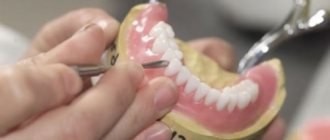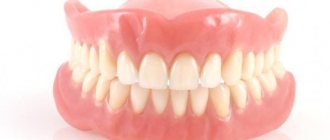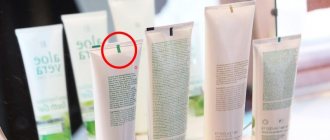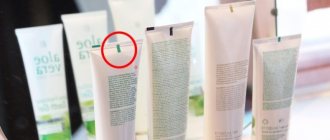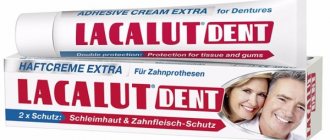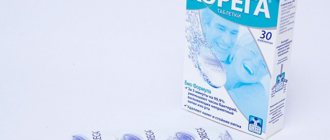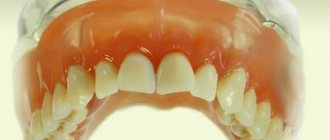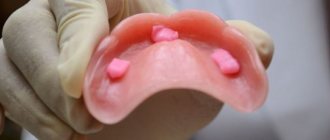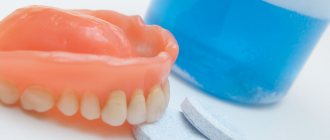About 50% of those who use removable dentures in everyday life indicate that the main problem in their use is insufficient strength of fixation in the oral cavity. This feature is the reason that when performing certain actions (eating, talking, laughing), the prosthesis can noticeably shift relative to its normal position.
To avoid such troubles, it is recommended to use special means that ensure high-quality fixation of dentures in the oral cavity.
Typically, when it comes to nylon and acrylic dentures, creams and gels are used. Gels are not inferior to creams in their functionality and differ from them only in consistency. Creams have a denser structure and are better suited for those who are just starting to use removable dentures.
Below we will consider the main means that are used for reliable and long-term fixation of dentures, their advantages and disadvantages.
ROCS
This drug was manufactured jointly by Russian and Swiss specialists and provides twelve-hour reliable fastening of the prosthesis, independent of the consumption of heated drinks and food.
Being distributed over the inner surface of the structure, this cream prevents small food particles from getting under the surface of the prosthesis. It should also be noted that the composition of this cream includes mint and menthol extracts, which significantly freshen breath and prevent the occurrence of unwanted odors.
Advantages
- Hydrophobicity. Cannot be washed off with any liquids.
- Lack of zinc element.
- Possibility of application to wet (not dried) dentures.
- The cream does not contain any artificial dyes or additives.
- Able to withstand the thermal effects of food, as well as drinks.
Flaws
- A high degree of thickness, which in some cases can complicate the uniform application of the cream.
- High price of the product.
In retail trade, the price for ROKS ranges from 250 to 400 rubles.
How does baby gel work?
Many dental gels during teething, due to the anesthetic they contain, do not penetrate the baby’s bloodstream and act only superficially. The anesthetic they contain helps to quickly relieve pain and alleviate the child’s condition. Also, there are gels without the inclusion of this substance, which provide an analgesic effect with other components (usually herbal). In addition, regardless of the main active ingredient, teething gels may contain other components that relieve inflammation and other symptoms in the child that are characteristic of the processes of formation and change of teeth.
Lacalut
Lacalut is a product of German technology of traditionally high quality. This cream, according to manufacturers, is capable of providing reliable adhesion of the prosthesis to the oral cavity for a period of more than 24 hours.
The cream forms a protective layer between the patient’s mucosa and the prosthesis, which effectively protects the oral cavity from potential injuries and rubbing by the edges of the prosthesis. This is especially true for those who have just started using removable dentures.
Lacalut cream contains a substance called aluminum lactate, which has a pronounced anti-inflammatory effect. This cream can be applied not only to dried, but also to moistened removable dentures.
Advantages
- Provides gentle operation of prostheses, minimizing possible injuries and abrasions in the process.
- It has a pleasant taste and aroma.
- Provides reliable long-term fixation of the prosthesis.
Flaws
- There may be a slight weakening of the fastening strength during the consumption of various hot foods or drinks, such as tea or coffee.
- Relatively high price.
The cost of Lacalut adhesive cream ranges from 300 to 450 rubles.
Rating of the best products for gums
| Nomination | Place | Name | Price |
| The best dental gels for gums | 1 | Elugel | 270 ₽ |
| 2 | Parodium | 370 ₽ | |
| 3 | Holisal | 420 ₽ | |
| 4 | Metrogil Denta | 225 ₽ | |
| 5 | Asepta | 200 ₽ | |
| 6 | Kamistad | 268 ₽ | |
| 7 | Periodonticide | 160 ₽ | |
| The best gum rinses | 1 | Biorepair Mouthwash Gum Protection | 990 ₽ |
| 2 | Listerine Expert Gum Protection | 197 ₽ | |
| 3 | Lacalut Active | 308 ₽ | |
| 4 | Asepta Active rinse aid | 258 ₽ | |
| 5 | Forest balm with pine nut oil and sage extract | 109 ₽ |
"Protefix"
The cream of this brand ensures reliable fastening of the removable structure for up to 14 hours. Three different types of this product are produced, one of which, due to the absence of any foreign dyes and flavoring additives in its composition, is hypoallergenic.
Advantages
- Complete absence of foreign tastes and odors.
- High reliability of fixation.
- Economical.
Flaws
- Due to its liquid consistency, the fixative may leak out of the bottle if it is not held strictly vertically.
- Not a particularly convenient dosing system.
The cost of this drug varies depending on the volume of the tube, usually ranging from 150 to 390 rubles.
Rules for dental care after removable dentures
Fixed prostheses include crowns, bridges, microprostheses (veneers, inlays), and implants. Ensuring their effective cleaning is more difficult than caring for removable structures: it’s easy to miss hard-to-reach places.
Dentists recommend following the following rules:
- Brush your teeth thoroughly 2 times a day. It is worth using a soft or medium-hard brush (preferably a hand brush), special pastes with low abrasiveness (for example: ASEPTA® Active therapeutic and prophylactic paste). If you use whitening pastes, avoid dentures when brushing.
- Use the irrigator after meals. It helps clean the interdental spaces from plaque, and is more effective with ASEPTA® solution. As a last resort, rinse your mouth thoroughly and use dental floss, including for cleaning dentures. Use floss carefully, especially in the crown area.
- Light gum massage. It is carried out to stimulate blood circulation and reduce the risk of gum inflammation.
Some manufacturers produce special brushes for cleaning teeth with dentures. Their bristles have different lengths, which allows you to effectively clean the interdental spaces.
"Fittydent"
"Fittident" is considered one of the best drugs for fixing dentures in the oral cavity , however, if the patient has increased sensitivity of the mucous membranes, then during the periods when "Fittident" is used, unpleasant sensations such as burning and/or characteristic tingling sensation.
To ensure that these side effects are avoided, after the cream is applied, let it dry for about half a minute.
Advantages
- Long fixation time provided by this drug.
- Lack of distinct taste.
- After removing the denture, no traces of cream remain in the patient’s mouth.
Flaws
- Difficult to find in city pharmacies in small towns.
- The cream must be applied exclusively to the dry surface of the prosthesis.
- Very thick structure of the drug.
The cost ranges around 270 rubles.
Treatment methods
Individual therapeutic regimens are selected for each patient. The specialist takes into account the general well-being of the patient, the nature of the pathology and the severity of symptoms. The main methods of therapy are divided into local and systemic. In the arsenal of local treatments, dentists have: rinses, local gels or medicated toothpastes.
Sometimes remedies that act locally are not enough. In this case, the dentist or orthodontist may prescribe systemic medications. These can be: antibacterial, antifungal agents, antihistamines, immunomodulators, vitamin-mineral complexes. And in this review we will look at the best products for gums in the form of gels and rinses.
"The president"
The prosthesis attached with this drug tightly adheres to the mucous membrane due to the formation of an elastic layer of high density, which prevents food particles from entering under the surface of the prosthesis.
The consumption of hot drinks, as well as food, in some cases can lead to a weakening of the fixing strength.
Advantages
- Larger volume compared to analogues.
- High strength of prosthesis fixation.
- Low cost of the product.
Flaws
- Strong foreign taste.
- Eating can weaken (sometimes quite significantly) the fixation.
The cost of the drug is approximately 250 rubles.
Possible causes of inflammation
Many things can cause gum inflammation, but most often the culprit is poor oral hygiene. If a person does not know about the existence of rinses, dental floss, or uses brushes of unsuitable hardness, then there is a high probability that food will accumulate in the spaces between his teeth, which is a breeding ground for bacteria.
Reactive gum inflammation is often triggered by the presence of tartar. First of all, it promotes the proliferation of pathogenic microorganisms. And the sharp edges of such formations easily damage the gums. The situation becomes worse under the influence of such factors:
- general weakening of the immune system due to systemic diseases, previous surgical interventions or infections;
- decreased local immunity after gum damage (wearing braces, hard bristles of a toothbrush);
- getting burns as a result of thermal or chemical exposure;
- deficiency of B vitamins, vitamin D or other micronutrients (poor diet or problems with the digestive system);
- endocrine pathologies (thyroid diseases, diabetes mellitus);
- unhealthy habits (tobacco smoking, alcohol abuse);
- taking certain groups of drugs (oral contraceptives, antihypertensive drugs, antidepressants, antibacterial agents).
If inflammation is present, the cause of the pathological condition must be determined. When contacting a dentist, you must inform him of all existing diseases, previous surgeries, or traumatic injuries experienced. If the cause is eliminated in time, this will protect against exacerbation of the disease in the future.
"Korega"
All components of fixing preparations from this manufacturer are hypoallergenic and do not cause any side effects when used as intended.
Advantages
- Corega cream is equally suitable for use with both dry and wet dentures.
- It is characterized by low allergic activity and ease of use.
- It has a very low cost.
Flaws
- A short period of full fastening, which does not exceed four hours.
- Not waterproof, washes off quickly.
- It comes to an end pretty quickly.
- During the absorption of food, the prosthesis may fall out due to the dissolution of this product.
- If you use Corega cream for quite a long time, swelling of the mucous membrane may develop.
The average cost of this cream does not exceed 300 rubles.
We would also like to note that in case of any complications associated with the use of dentures, you should immediately contact the VivaDent clinic.
Types of inflammation and possible symptoms
There are two main types of inflammatory processes in the gums:
Gingivitis. This is a shallow inflammation of the gums, in which the periodontal joints are not affected. Most often this means inflammation of the gum area between two adjacent teeth. Moreover, this pathology is not dangerous for the teeth themselves. It does not cause their mobility.
Periodontitis. With this pathology, inflammation spreads to tissues that are located deep (bone structure, tooth roots). In this case, periodontal pockets often form. They accumulate food particles and soft plaque, which over time aggravates the situation.
With periodontitis, decay processes often occur, and the teeth become very mobile and there is a high risk of their loss. Both diseases can occur locally or affect the entire periodontium. A limited local inflammatory process most often occurs against the background of injury. General inflammation is usually caused by other negative factors.
It is quite easy to recognize gum inflammation by the following symptoms:
- hyperemia, tissue swelling;
- increased sensitivity of periodontal tissues;
- the appearance of bleeding;
- loose gums;
- bad breath.
If periodontitis is advanced, then the appearance of purulent discharge and a feverish state is possible. With ulcerative gingivitis, ulcers appear on the surface of the soft tissues. Atrophic gingivitis leads to exposure of the tooth necks. This in turn makes teeth more sensitive to hot or cold food.
Conditions that quality compounds must satisfy
Good developments used by dentists for aseptic purposes must meet a number of requirements:
- exhibit high activity against fungi, viruses, bacteria;
- provide a reliable clinical effect when used in low concentrations;
- in the case of systemic absorption, do not have a pronounced negative effect on the body or internal organs;
- be characterized by a minimal risk of synthesization;
- do not cause poisoning if used in the dosages established by the manufacturer;
- have a neutral smell and taste.
Among the most popular medications that meet these requirements:
- made from iodine;
- including chlorine;
- containing hexetidine.
Let's look at each type of mouth antiseptic in more detail.
Iodine preparations
Iodine is a substance that exhibits pronounced antiseptic properties. It destroys many fungi and microbes and acts as an effective antiprotozoal. Relieves pain, deodorizes, helps to quickly stop bleeding. They are allowed to cauterize wounds.
When treating mucous membranes, undiluted iodine is not used - it must be diluted in the required proportion. Otherwise, you can get a burn to the delicate membranes, which will take a long time to heal.
Iodine must not be combined with alkali, mercury, enzymes, or oxidizing agents. It is also pharmacologically incompatible with ammonia and ethers.
Chlorine
The most prominent representative of the chlorine-containing group is chlorhexidine, a biguanide derivative. It oxidizes and chlorinates proteins, causing their denaturation. As a result, a pronounced deodorizing and antiseptic effect is ensured, pathogenic tissues are destroyed.
Chlorhexidine is found in many oral antiseptics. It is even included in preventive toothpastes. It destroys gram-negative and gram-positive bacteria, fungi, anaerobes, herpes, facultative aerobes. With regular use, the content of pathogenic microorganisms in saliva is reduced by approximately 80-90%. As a result, the rate of plaque deposition is reduced and stone prevention is ensured.
The therapeutic effect of chlorhexidine is explained by the interaction of its positively charged molecules with negative groups of molecules in the bacterial cell wall. The component quickly penetrates the inflammatory focus, reaches the cytoplasmic layers of the microorganism and kills it.
Interestingly, the product is selectively absorbed onto enamel hydroxyapatite . This means that it does not allow bacteria to multiply on the surface of the dental crown. Since it binds tightly to proteins, the therapeutic effect is prolonged - the release of antiseptic substances occurs gradually.
In addition to antibacterial activity, chlorhexidine also exhibits a weak analgesic effect. It is important to remember that its use on an ongoing basis leads to dysbacteriosis. Therefore, there is no need to use chlorhexidine-containing drugs on an ongoing basis.
Do not combine the additive with soap, alkalis, or anionic detergents. It should be taken into account that it increases the sensitivity of the human body to chloramphenicol, cephalosporins, and aminoglycosides.
Preparations based on hexethidine
Hexethidine is a cell membrane destroyer. It accelerates the death of pathogenic organisms and disrupts the synthesis processes necessary for the spread of pathogenic flora. The antifungal activity of the drug is associated with its ability to interfere with the formation of compounds necessary for the formation of the fungal membrane.
It has been established that hexetidine is effective in pathologies caused by:
- mushrooms of the genus Candida;
- Proteus;
- Pseudomonas aeruginosa.
Medicines containing the component relieve pain, stop the spread of inflammation, deodorize and envelop wounds. They help with candidiasis, stomatitis, glossitis, periodontal disease, aphthae, and increased bleeding of the gums. Hexethidine is allowed to treat microtraumas and purulent-inflammatory areas. It is also used in the antiseptic treatment of root canals in the treatment of periodontitis and pulpitis.
